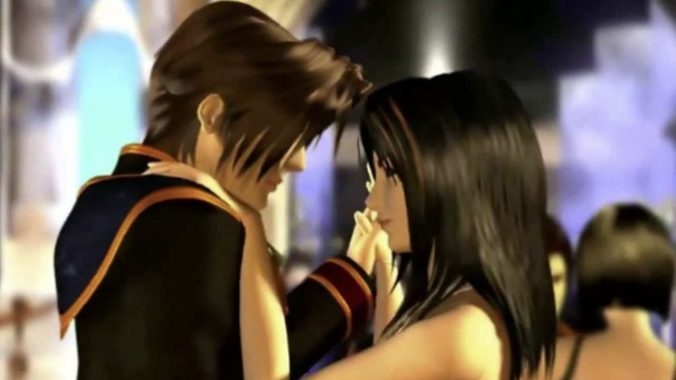25 Years Later People Are Still Overthinking Final Fantasy VIII

It’s hard to fathom the unbelievable expectations leading up to Final Fantasy VIII. Released just two years after the landmark Final Fantasy VII, the franchise’s angstier younger brother was an instant commercial success, breaking the record for fastest-selling in the series until Final Fantasy XIII, which only managed to outpace VIII by being a multiplatform release. Production of the game took place during the English translation of VII, before Square had any idea what a phenomenon that game would be in the Western market, and was helmed by Yoshinori Kitase, who by then was a key member of Square’s development team, having directed and written Final Fantasy VI, VII, and Chrono Trigger.
Kitase was a film student who applied to Square on a whim with no software development knowledge. After rising in the ranks having mostly been an event planner and scenario writer, Kitase is largely credited for moving the series into the “cinematic” territory it’s known for now, something he has referred to as a similar experience to “directing actors on the set of a movie.” Like many creatives of his generation, Kitase was influenced heavily by sci-fi and fantasy movies from the ‘70s, particularly Star Wars, and sought to replicate that sense of real character drama within operatic stories about oppression and heroism.
Final Fantasy VIII was conceived by Kitase, Kazushige Nojima, and Tetsuya Nomura with these themes in mind, but to contrast the dark and depressing VII, the team turned to nostalgia for their school days as inspiration. Kitase was inspired by the rustic architecture of historic European cities and sought to combine this look with the futurism the series had come to be associated with. Character designs were also simplified (relatively speaking) and made to look more realistic (comparatively) because the team wanted to focus on in-game character models being as expressive as possible, with an emphasis on body language helping further characterize the cast. This combined with the new method used to localize the game for English release meant VIII would be more accessible and less clunky for international audiences, where RPGs were only just becoming popular outside of niche spheres.
It may be hard to believe now, given its overwhelming reputation as the black sheep of the franchise, but Final Fantasy VIII was just as acclaimed critically as VII upon release, if not more. In a SPIN review, Francis Hwang made note of the “mindblowing graphics” and scene direction being unlike anything seen in gaming yet, declaring it as exceeding the already sky high hype surrounding its release. He also noted Final Fantasy might soon take over the world of animation after the release of its first movie two years later in 2001 (yikes). Though many reviews cited the still common complaints about VIII’s mercurial Junction system, the story was universally praised. Gamespot claimed that despite the story’s many cliches, it “manages to make them interesting and complicated, yet completely accessible and even rather plausible.” IGN’s review was less glowing, but still notes the “intimate, character-driven work” as being a breath of fresh air when compared to the series’ earth shattering previous narratives.
If you’re even marginally aware of Final Fantasy VIII’s reception over the last 25 years, you certainly know that many consider its story, with all its spacefaring twists, metaphysical flashbacks, and “Thriller” inspired parade routines, as gobbledegook. Many consider Squall and Rinoa the weakest leading duo of the series, despite the game’s major focus on their love story. They’re even embracing in the logo! Cloud’s extreme stoicism is seen as justified when players learn about his traumatic past midway through the game, and his development throughout the game is unquestionably transformative. The Cloud we end off with at the end of VII is such a different person than the one we began with that we’re left wondering who he will be once the dust settles. Squall, however, has a running internal monologue throughout the entire game. His behavior is less caustic than Cloud’s, but his gloomy sentiment and angst surrounding his inability to open up to anyone is a constant struggle throughout VIII, and we see every messy thought in real time.
Ask me on the right day and I would say Squall is my favorite protagonist in the series for precisely the reasons many fans dislike him. He’s mopey, self-defeating, and by the end is still mostly the same person he was at the start, just with a girlfriend now. But it’s those small changes in his outlook on life that make him so compelling. Final Fantasy VIII’s cast is much more subdued and in the background when compared to VII’s or IX’s, but in their clipped interactions and failure to revisit interpersonal conflicts, we understand them as real people as opposed to heightened ciphers with neat character arcs. Quistis struggles to understand her projection of loneliness onto Squall and the inappropriate dynamic she establishes between them. Squall has to comfort the otherwise cocky Irvine through his assassination attempt on Edea, as he crumbles under pressure before taking his shot. And Rinoa, God love her, is a stubborn rich girl who uses direct action as a way to cope with her lack of real connections and frustrated relationship with her father.